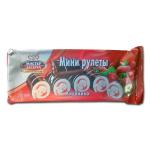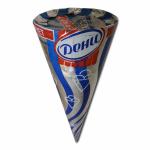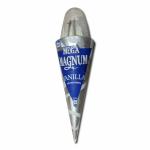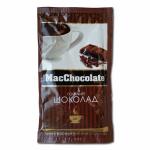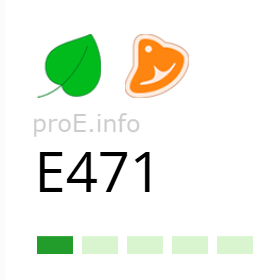
Other names for the additive (synonyms)
General Information
E471 is a food additive used as a stabilizer and emulsifier. It consists of mono- and diglycerides of fatty acids. The additive has a natural origin and is primarily produced from vegetable fats (palm, soybean, rapeseed oil) and glycerol. The final mixture may contain up to 90–95% monoglycerides. Impurities may include free glycerol, free fatty acids, unsaponifiable fats, and polyglycerol esters.
Animal fats may also be used in the production of this additive, which is important for vegetarians to consider. It's necessary to check not only for the presence of E471 on the label but also for information about the source of the fats.
The main purpose of this additive is to create a uniform mixture from substances that do not naturally mix. E471 is most commonly used in the production of dairy and high-fat products.
The emulsifier helps preserve the taste and aroma of the product for a longer period, improves consistency (increases viscosity), retains moisture, stabilizes foam, and helps form a gel-like texture. E471 also extends the shelf life of food products.
Emulsifier E471 is not soluble in water. It may dissolve in chloroform, benzene, and alcohol.
Main characteristics of food additive E471:
- Color – from pale yellow to light brown.
- Taste – neutral.
- Odor – none.
- Consistency – liquid oil (glycerides of unsaturated fatty acids), powder, flakes, granules (glycerides of saturated fatty acids).
Effects on the Body
Benefits of Additive E471
E471 is considered a harmless food additive. Mono- and diglycerides of fatty acids are structurally similar to partially digestible natural fats. The body processes the emulsifier the same way it processes other fats.
Risks of Additive E471
Negative effects are only associated with excessive fat intake. It should be noted that this emulsifier has no established acceptable daily intake. However, E471 increases the caloric value of foods, so people with liver diseases, metabolic disorders, excess weight, or those following a diet should consume it with caution.
Children who consume large amounts of products containing E471 may develop obesity over time.
Uses
Main products that use E471 include:
- margarines,
- ice cream,
- mayonnaise,
- yogurts,
- chocolate,
- chewing gum,
- fats and sauces,
- dairy products,
- marmalade,
- jams.
E471 is also used in the production of baby food, infant formula, complementary foods, and milk-based formulas.
Legal Status
E471 has GRAS status (Generally Recognized As Safe), which allows it to be used without restriction. The emulsifier is approved for use in the food industry in all countries. No maximum permitted level has been established.
